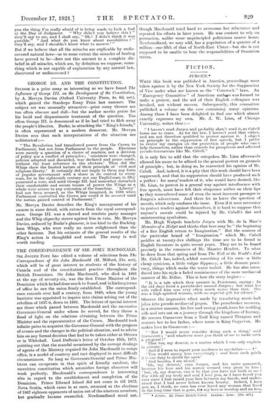GEORGE III. AND THE CONSTITUTION. SELDOM is a prize essay
so interesting as we have found The Influence of George III. on the Development of the Constitution, by A. Mervyn Davies (Oxford University Press, 4s. 6d. net),
which gained the Stanhope Essay Prize last summer. The subject set was unusually attractive—prize essay themes are too often obscure and dull—but the author merits praise for his lucid and dispassionate treatment of the question. Too often George III. is denounced as if he had tried to filch away the people's liberties. Burke, in attacking the " King's friends," is often represented as a modem democrat. Mr. Mervyn Davies sees that such interpretations of the situation are unhistorical :—
" The Revolution had transferred power from the Crown to Parliament, but not from Parliament to the people. Elections were merely a question of a choice of masters, not a decision of policy nor a conflict of principles ; ministers were changed, policies adopted and discarded, war declared and peace made, without the least reference to the electors.' Thus did the Whigs show the limited nature of their principle of civil and religious liberty.' It certainly did not imply to them any form of popular government with a share in its control to every man, for in the eighteenth century not one Englishman in fifty possessed a vote, and until George III. had somewhat disturbed their comfortable and secure tenure of power the Whigs as a whole were averse to any extension of the franchise. Liberty ' had not been secured, as the Whigs imagined, in 1688 when Parliament controlled the Crown nor could it be secured until the nation gained control of Parliament."
Mr. Mervyn Davies describes the King's management of his caucus in some detail, with extracts from the royal correspond. ence. George III. was a shrewd and resolute party manager and the Whig oligarchy strove against him in vain. Mr. Mervyn Davies, seduced by Burke's glamour, is too kind to the Rocking- ham Whigs, who were really no more enlightened than the other factions. But his estimate of the general results of the King's action is thoughtful and sound. The essay is well worth reading.






































 Previous page
Previous page